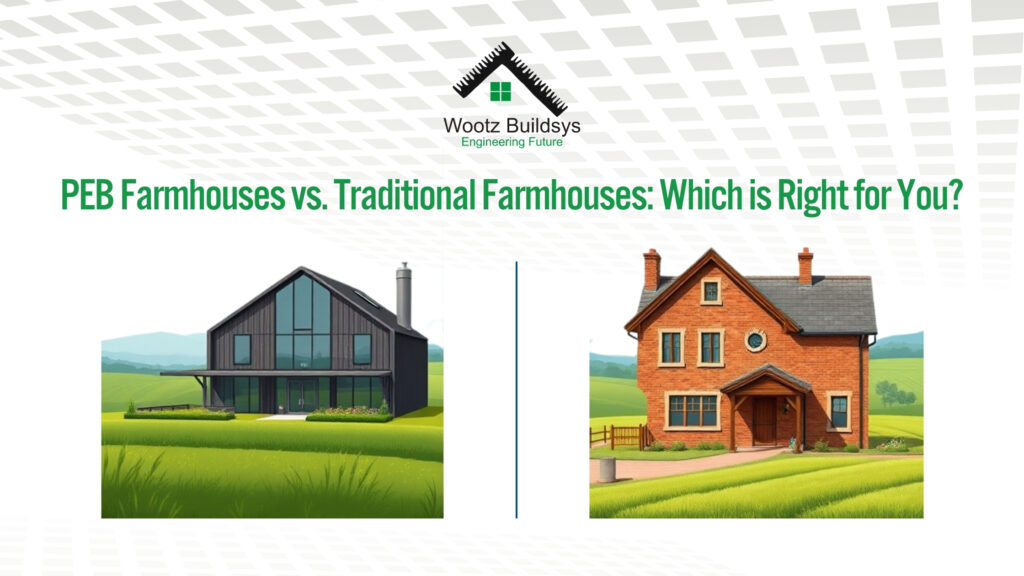
When it comes to building a farmhouse, the choice between pre-engineered buildings (PEB Farmhouse) and traditional construction can make all the difference in cost, time, and overall satisfaction. Understanding the advantages and potential drawbacks of each approach can help you decide which option best suits your needs.
Understanding PEB Farmhouse
PEB farmhouses are constructed using a pre-engineered steel framework, which is manufactured off-site and then assembled on location. This method has gained popularity due to its efficiency, durability, and flexibility in design.
Advantages of PEB Farmhouse:
- Faster Construction Time: Since components are pre-manufactured, assembly is quick, saving valuable time.
- Cost-Efficiency: PEB structures can be more cost-effective, reducing labor and material waste.
- Durability: Steel structures are known for their high strength and resistance to environmental factors like harsh weather, termites, and fire.
- Customization: PEBs offer various design options and can be tailored to your preferences, whether you’re looking for a modern or traditional aesthetic.
- Eco-Friendly: With reduced material waste and recyclable components, PEB farmhouses are a sustainable choice.
Understanding Traditional Farmhouses
Traditional farmhouses are built using conventional materials like bricks, cement, and wood. This method is deeply rooted in architectural tradition and can lend a timeless appeal to a property.
Advantages of Traditional Farmhouse:
- Classic Aesthetic: Traditional farmhouses often embody a charm and warmth that is hard to replicate.
- Familiar Construction Methods: Builders are generally more familiar with traditional methods, making sourcing and constructing straightforward.
- Customization with Detail: Traditional construction allows for intricate design details and custom work.
Comparison: Key Differences
- Construction Time: PEB farmhouses can be completed in weeks, whereas traditional farmhouses may take several months to a year due to on-site construction processes.
- Cost: PEB structures are generally less expensive due to reduced labor costs and material efficiency. Traditional methods might incur higher expenses due to longer construction periods and potential for material wastage.
- Durability: PEB structures are inherently more resistant to environmental factors than many traditional materials, especially wood.
- Design Flexibility: Both options offer customization, but PEBs can adapt to innovative and modern designs more easily.
- Maintenance: PEBs require less maintenance compared to traditional structures that may need frequent repairs, especially if made of wood.
Which Option Should You Choose?
- Budget Constraints: If budget is a major concern, a PEB farmhouse might be the better choice due to its cost-effectiveness.
- Time Sensitivity: For those who need a quicker turnaround, PEB construction offers significant time savings.
- Aesthetic Preferences: If you desire a traditional look and feel with detailed architectural elements, a conventional farmhouse may be more appealing.
- Sustainability: PEBs are a greener option, thanks to recyclable materials and minimal waste.
Conclusion
The choice between a PEB farmhouse and a traditional one ultimately comes down to your priorities: budget, time, aesthetic preferences, and sustainability. PEB farmhouses offer a modern, cost-effective, and durable solution, while traditional farmhouses provide timeless charm and intricate detail. Understanding these differences will help you make an informed decision that best fits your lifestyle and goals.
Frequently Asked Questions (FAQs)
Q: Are PEB farmhouses strong enough to withstand severe weather?
A: Yes, PEB farmhouses are designed to be highly durable and can withstand severe weather conditions, making them an excellent choice for regions with challenging climates.
Q: Can a PEB farmhouse be designed to look traditional?
A: Absolutely. PEB structures are highly versatile and can be designed to mimic the appearance of a traditional farmhouse.
Q: What is the lifespan of a PEB farmhouse compared to a traditional one?
A: PEB structures generally have a longer lifespan due to the durability of steel and reduced susceptibility to issues like rot and termite damage.
Q: How eco-friendly are PEB farmhouses?
A: PEB farmhouses are eco-friendly due to efficient use of materials, recyclability of steel, and less construction waste.


